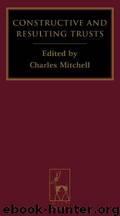Constructive and Resulting Trusts by Charles Mitchell

Author:Charles Mitchell [Mitchell, Charles]
Language: eng
Format: epub
Tags: Education & Reference, Law, Tax Law, Administrative Law, Estates & Trusts
ISBN: 9781841139272
Amazon: 1841139270
Publisher: Hart Publishing
Published: 2010-03-02T14:00:00+00:00
6
The Centrality of Constructive and Resulting Trusts
BEN McFARLANE
A. TWO PERSPECTIVES
How central are constructive and resulting trusts to the law of trusts? The answer given to this question, like any survey of a particular field, will depend on the observer’s perspective. On a particular (and not uncommon) view of the law of trusts, constructive and resulting trusts are anomalies in special need of justification. On this view, the existence of an express trust can be simply explained: a party with a right (the settlor) has exercised a power to ensure that his right be held in a particular way. That power can be exercised either by the settlor transferring his right to a trustee to hold on trust for a beneficiary; or by the settlor declaring that he holds his right on trust for a beneficiary. This perspective does not depend on, but is often linked to, the equally common view that a beneficiary under a trust has a property right. The settlor is viewed in much the same way as a party with a freehold who gives another a legal lease or legal easement: he has simply dealt with his property in such a way as to give another a right in that property. Of course, a number of trusts, usually labelled as constructive or resulting trusts, cannot be accommodated within this model: they are so labelled precisely because their existence cannot readily be explained as dependent on a settlor’s exercise of his power to set up a trust.
On this first view, it may be possible to rehabilitate at least some of these anomalous constructive and resulting trusts by explaining that, initial appearances notwithstanding, they also depend on a settlor’s exercise of his power to set up a trust.1 However, some such trusts simply cannot be dressed up in that way: the constructive trust recognised by the Privy Council in Attorney-General of Hong Kong v Reid2 provides one obvious example; the form of resulting trust recognised by the House of Lords in Vandervell v IRC3 provides another. On the first view, then, such trusts remain unprotected and open to doubt; it may even be argued that our highest courts have been mistaken in recognising them.4 After all, it seems that a legal lease or legal easement cannot arise unless a grantor has exercised his power to create such a right;5 why should anyone acquire a right under a trust if a settlor has not exercised his power to create such a right? Further, even if such a trust arises to protect its beneficiary, why should that party receive an equitable property right rather than a personal right?6
The main purpose of this chapter is to argue against both that first view and the proprietary model of the trust to which it is linked. Building on the analyses of Professor Chambers and Professor Smith, as well as my own work in The Structure of Property Law,7 it will be argued that resulting and constructive trusts are far from anomalous and that is a mistake to accord primacy to the express trust.
Download
This site does not store any files on its server. We only index and link to content provided by other sites. Please contact the content providers to delete copyright contents if any and email us, we'll remove relevant links or contents immediately.
Machine Learning at Scale with H2O by Gregory Keys | David Whiting(4289)
Killers of the Flower Moon by David Grann(4029)
Oathbringer (The Stormlight Archive, Book 3) by Brandon Sanderson(3121)
Will by Will Smith(2899)
Once Upon a Broken Heart by Stephanie Garber(2839)
Guns, Germs and Steel by Diamond Jared(2363)
It Starts With Us (It Ends with Us #2) by Colleen Hoover(2325)
Borders by unknow(2300)
Friends, Lovers, and the Big Terrible Thing by Matthew Perry(2211)
The Room Where It Happened by John Bolton;(2144)
The Color of Law by Richard Rothstein(1920)
The Strength In Our Scars by Bianca Sparacino(1834)
HBR's 10 Must Reads 2022 by Harvard Business Review(1832)
A Short History of War by Jeremy Black(1831)
A Game of Thrones (The Illustrated Edition) by George R. R. Martin(1705)
Water Rights and the Environment in the United States by John Burch(1673)
515945210 by Unknown(1660)
Examples & Explanations: Administrative Law by William F. Funk & Richard H. Seamon(1631)
That Every Man Be Armed by Stephen P. Halbrook(1575)
